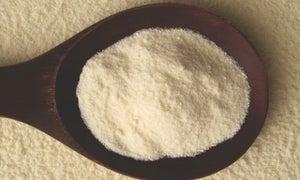Powder Power: The Importance Of Dietary Protein

Endurance athletes are often preoccupied with feasting on enough carbohydrates to keep energy levels up and prevent the dreaded bonk. Yet according to sports dietitian Cassandra Forsythe, Ph.D., R.D., to improve muscle recovery, boost strength and replace protein used during bouts of prolonged exercise, triathletes should not overlook the importance of dietary protein.
Written by: Matthew Kadey, M.S., R.D.

While it’s possible to get all the protein you need from whole foods such as poultry, yogurt and beans, the various guises of protein powders can offer a convenient, dependable source for the busy triathlete.
“Protein powders are particularly useful very soon after exercise, when weary muscles crave amino acids for muscle repair,” Forsythe says. “A protein drink in this timeframe is generally a lot less hassle than cooking a chicken breast, and the liquid protein is digested and made available to the muscles much faster.” A post-workout or breakfast-on-the-go protein shake can also be a great way to sneak more fruits and dairy into a training diet. Here are five powders to consider.
Whey
Protein per 30g serving: 17–25g
The epitome of protein powders is widely available, digests quickly and contains an abundance of amino acids, including leucine—needed to encourage post-exercise muscle recovery, particularly when paired with carbohydrates. Find unflavored versions to avoid added sugars and artificial sweeteners.
Hemp
Protein per 30g serving: 11–21g
Most plant proteins are labeled “incomplete” because they lack essential amino acids. “Hemp protein, however, contains a full complement of essential amino acids, making it a great raw vegetarian option,” says Forsythe. It contains good amounts of fiber and heart-healthy omega fats. It tastes, well, earthy, so you’ll want to blend it with plenty of sweet-tasting fruit.
Soy
Protein per 30g serving: 23–26g
Similar to hemp, soy protein is considered a high-quality, complete vegetarian protein. A recent study reported that soy is just as good as milk protein in stimulating muscle protein synthesis. Look for “isolated” soy protein, which contains very little gas-producing oligosaccharides.
Egg
Protein per 30g serving: 16–20g
Egg protein powder is derived from egg whites and is fat-free. “It’s the standard by which all other protein powders are measured because it’s the highest quality protein,” says Forsythe. It’s packed with amino acids that are very effective at repairing and building muscle, but unfortunately, it tends to be pricey and not everyone is crazy about the taste.
Casein
Protein per 30g serving: 20–25g
Like whey, casein protein is derived from dairy. However, it’s much slower to digest and therefore should be consumed before bedtime or anytime there might be a prolonged gap between eating to keep a steady flow of amino acids going to the muscles.
Matthew Kadey is a dietitian, nutrition writer and avid mountain biker based in Ontario, Canada.